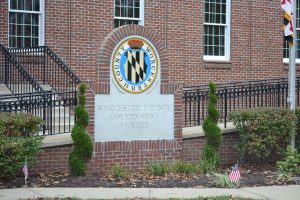
SNOW HILL – The Worcester County Commissioners opted not to approve a rezoning request for property along Route 113 north of Berlin.
A motion to approve a rezoning request for commercial property near Route 113 and Pin Oak Drive failed with a 3-4 vote by the commissioners Tuesday. The change, which was supported by the Worcester County Planning Commission, was one of a handful of recent zoning changes that have been denied. The decision prompted criticism from Commissioner Joe Mitrecic, who made the failed motion to approve the zoning change.
“I think the commissioners need to look at who they’ve got on planning and zoning committee and reassess, and maybe put people on there that have their ideals moving forward,” Mitrecic said. “You’re costing these applicants a lot of money to come in here with lawyers to turn them down… If we’re going to grind this county to a stop let’s do it at planning and zoning and not here.”
According to county staff, Pin Oak Properties LLC wanted to change the zoning of 5.5 acres from C-1 (neighborhood commercial district) to C-2 (general commercial district).
“The planning commission concluded the change in zoning would be more desirable in terms of the objectives of the comprehensive plan and gave a favorable recommendation,” said Matthew Laick, deputy director of development review and permitting.
Hugh Cropper, the attorney for the applicant, said the change was being sought to correct a mistake that had been made. He said a site plan showed a large contractor shop on the property as far back as the 1990s despite the fact that C-1 zoning only allows buildings less than 2,500 square feet. He said a nonconformity was created in 2009 when the property was given C-1 zoning because there was an 8,000-square-foot shop on the site.
He said the second mistake with the property’s C-1 zoning was the fact that C-1 is meant for businesses that serve neighborhoods.
“When you drive by it in the summer you can’t even see it,” he said. “It doesn’t have the visibility and the accessibility to be a neighborhood commercial.”
He added that before his client had purchased the land in 2006, it had been used by Atlantic Aquatech and had essentially been an industrial site. Cropper said his client wanted to expand and improve the site, which is currently being used as contractor shop. He said that couldn’t be done without a rezoning. While the board of zoning appeals can grant special exceptions, Cropper said a special exception would only allow up to 5,000 square feet.
When commissioners questioned whether the 8,000-square-foot building was currently being used, staff said it was.
“The business is operational, he just has limits on expansion,” said Jennifer Keener, the director of development review and permitting.
Commissioner Eric Fiori said that during the comprehensive rezoning in 2009, multiple properties on Route 113 had been downzoned to C-1. He added that the subject property had an entrance through a residential zone, not on Route 113.
“Explain to me where the mistake was made, as all these other properties within 1,000 feet were dropped back to C-1,” Fiori said.
Cropper said that because of the unique configuration of his client’s property and the fact that the building couldn’t be seen from the road it was not neighborhood commercial but rather a destination.
“You need to know it’s there,” he said.
He said the properties to the south of this one were zoned C-2.
“Everything to the south is still C-2 all the way down to the hospital, or it’s in the Town of Berlin,” he said.
Cropper maintained that C-1 was meant to provide convenient services for neighborhoods.
“It’s our position this is a destination commercial area,” he said.
Commissioner Jim Bunting said there were apartment buildings within the subdivision the subject property was in.
“I view it as C-1 zoning being the best use for this property,” Bunting said.
Cropper responded that a five-acre site wasn’t needed to serve 30 residences.
Though Mitrecic made a motion to approve the zoning change, it failed with a 3-4 vote. Fiori, Bunting and Commissioners Chip Bertino and Caryn Abbott voted in opposition.
At the end of the meeting, Mitrecic said changes were needed to the planning commission if the commissioners had such drastically different views. He said he didn’t want to see applicants spend the money going through the process when their requests were just going to be denied by the commissioners.
Fiori said he agreed in a way but also felt that lawyers shouldn’t be bringing rezonings of “major commercial projects” that sit next to agricultural zones.
“I think it’s the responsibilities of the lawyers as well to not bring in these outrageous rezonings and expect to come victorious,” he said.
He added that he didn’t want to see Worcester become as overdeveloped as Sussex County was. Fiori said he agreed with Mitrecic that different representatives were needed on the planning commission.
Bertino pointed out the commission and committee members all had specific terms they served.
“The terms of the members of the planning commission and a lot of the advisory committees are set,” he said. “The discretion of individual commissioners to replace a particular appointee is limited. We can’t do it midterm.”

